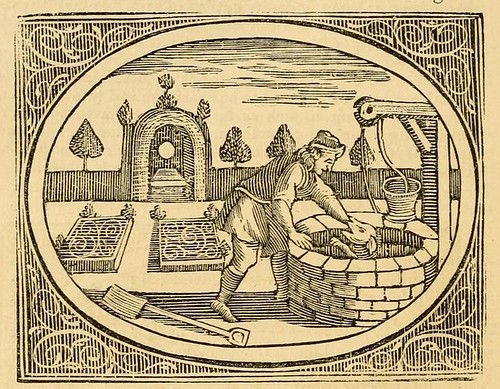HODIE: ante diem quartum Idus Octobres (and yes, you can have your own Roman Google Calendar).
VERBUM HODIERNUM: Today's word is ILLE - read a brief essay about the word at the Verbosum blog. Here's one of the sayings you can find in the essay: Tempora mutantur, et nos in illis, "The times change, and we change with them."
MILLE FABULAE: New materials at the blog include some more illustrated fables. This is also where you can download your free PDF copy of the Mille Fabulae et Una book.
FABULAE FACILES: The new easy-to-read fable is Olitor et Canis, a story about how you can't help someone who doesn't want to be helped.
ENGLISH AESOP: Today's English fables are from Sir Roger L'Estrange, the limericks for Walter Crane's illustrated Aesop and Wright's verse translation of La Fontaine.
TODAY'S MOTTOES & PROVERBS: Widgets available at SchoolhouseWidgets.com.
3-Word Mottoes: Today's 3-word motto is Efficiunt claros studia (English: Studies make us famous - or, at least, it makes us Google-able, ha ha).
3-Word Proverbs: Today's 3-word proverb is Cura omnia potest (English: Careful effort accomplishes everything).
Rhyming Proverbs: Today's proverb with rhyme is: Audi, cerne, tace, si vis tu vivere pace (English: Listen, look, and be silent, if you want to live in peace).
Vulgate Verse: Today's verse is Qui operatur terram suam, saturabitur panibus (Proverbs 12:11). For a translation, check out the polyglot Bible, in English, Hebrew, Latin and Greek, at the Sacred Texts Archive online.
Elizabethan Proverb Commentary: Here is today's proverb commentary, this time by Taverner: Aegroto dum anima est, spes est: The sicke person while he hath life, hath hope. So swete a thinge is life, that he that is brought never so lowe, yet hopeth to live.
Today's Poem: Today's poem is from the rhyming sayings collected by Wegeler, with a word list at NoDictionaries.com:
Tu, qui festucam vicini in lumine cernis,English: "You who see the bit of straw in your neighbor's eye, why do you disdain to pull out the log from your own eye?" It's a rhyming version of Matthew 7.
Tignum cur trahere proprio de lumine spernis?
Today's image is an illustration for the story of the gardener and the dog: 838. Olitor et Canis. Delapsum in puteum canem olitor servare et retrahere cupiens, demisit et eodem se ipse. Canis, veritus ne descendisset sibi nocendi gratia et ut suffocaret demersum, dentibus illum petebat et morsu lacerabat. Tum saucius olitor, cum dolore, “Iure mihi,” inquit, “hoc accidisse fateor. Cur enim auctorem ipsum sibi interitus ego servare volui?” (source - easy version).
